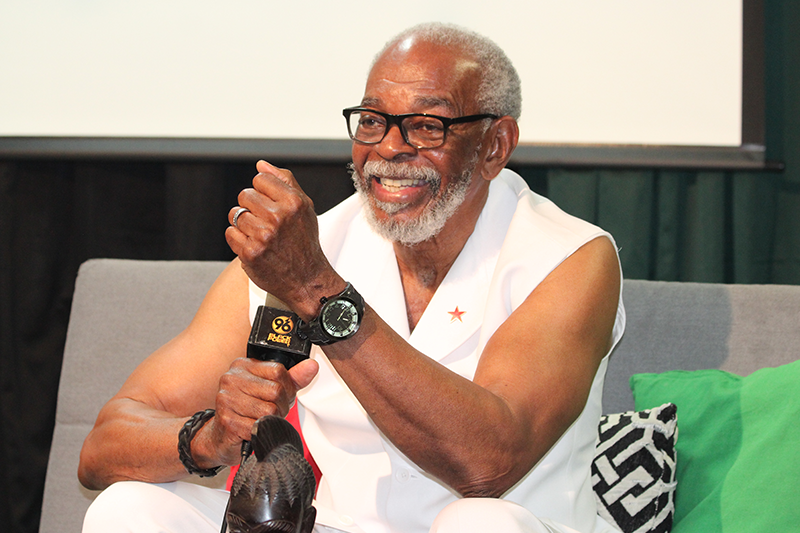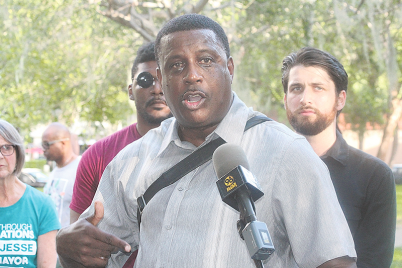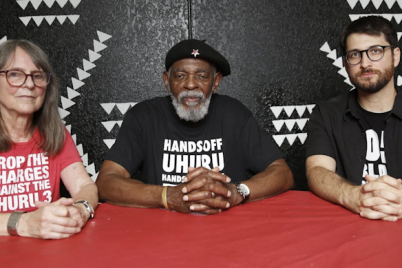Chairman Omali Yeshitela
BY FRANK DROUZAS, Staff Writer
ST. PETERSBURG –Chairman Omali Yeshitela, co-founder of the African Peoples Socialist Party, regaled a standing room only crowd of his time spent in Oxford, England, in Jan. debating so-called preeminent minds on the question of whether the Oxford Union should embrace an ever closer African union.
Penny Hess, chairwoman of the African People’s Solidarity Committee, introduced Yeshitela as a leader who proved that capitalism is parasitic, “born on the backs African people.”
“The chairman electrified a room of 300 people, most of whom have never heard anything like this. He brought the truth of the African revolution to the heart of the training ground for white power and colonialism—Oxford University,” said Hess, who has worked alongside Yeshitela for more than 40 years.
Yeshitela admitted that when he was initially invited to join the Oxford Union to debate, he suspected it might have been a mistake. Even the required dress code gave him pause, and he considered not participating at all, as he would not have been comfortable. He abandoned the tuxedo he had rented and decided to just be himself; stuffy dress code be damned.
“I was the odd person out.” he explained, “and I just took some St. Pete, Africa Uhuru swag into Oxford!” he said.
He said Oxford has been the headquarters for some time of training colonizers, and “puppets” that they had put in charge all over the world. Whites stole many parts of Africa from the native populations and controlled by these invaders. In South Africa alone, whites control close to 87 percent of the land–four and a half times larger than England and Northern Ireland combined.
To suppress the African people of Zimbabwe, for example, the controlling white population enacted sanctions to starve the African people, created unrest among them and created the Movement for Democratic Change, Yeshitela said.
The former Deputy Prime Minister of Zimbabwe Arthur Mutambara participated in the debate, along with an American that was arguing on the same side as Yeshitela. He called himself a “proud African American,” Yeshitela said.
“At a time when we’re saying, ‘One Africa, One Nation,’ he is making it clear to the white folk: ‘I am a proud African American!'” Yeshitela recalled.
This man served as the ambassador to the Organization of African Unity, and is a graduate of Oxford–an institution that creates neo-colonial forces that “white power can use to dominate the rest of us,” Yeshitela said.
At a dinner before the debates, Yeshitela found himself seated next to the former Deputy Prime Minister of Zimbabwe, who proceeded to talk about his education and credentials and then asked Yeshitela about his. Doubtless, the former Deputy Prime Minister expected to hear about prestigious places of higher learning. Yeshitela was more direct.
“But my education was on the streets of St. Petersburg, Fla.,” he said.
Yeshitela talked of the revolutions that were occurring all over the world in the 1960s, when many of them came to a head, including in China, Vietnam, Cuba and right here in America. Some of the revolutionaries were imprisoned or worse, gunned down by counter-revolutionary forces: Dr. Martin Luther King, Malcolm X and many members of the Black Panthers. During these hectic times of upheaval, Yeshitela frequently found himself incarcerated.
“I was in jail so often I had to read the newspaper to find out where I was!” he said.
Yeshitela called this “counter-insurgency” and art created by oppressors.
“They have to create a science and an art to keep oppressed people down because nobody will voluntarily work all day, work their lives off and then volunteer their children and their progeny to a future of nothingness!” he said.
The oppressors use all forms of warfare: ideological, psychological and even economic warfare–all of which are backed by armed force in the communities.
Yeshitela pointed out that revolutionary Malcolm X spoke at the Oxford Union, and when he was asked about the future, Malcolm X replied, “They’re going to kill me.” Two months later, he was murdered.
Why was he at Oxford Union?
“Because the people at the Oxford Union began to recognize a whole new defining trend that was emerging in the African liberation movement,” Yeshitela said, adding that the Oxford Union had its own selfish reasons for wanting to be on top of this new trend of thought at the time.
Since Malcolm X’s time, there have been a few generations worth of revolutions that have been defeated–not only in America but around the world.
“The truth is that America cannot survive the emancipation of African people,” he said. “And it has no intentions of doing that.”
He denounced a social system that has its origin and foundation in enslaving black people and remarked that if people don’t have their own revolutionary philosophy, they end up borrowing the philosophy of their oppressors.
“And you wonder why you can’t get out of this hole that we’re in,” he said.
That’s why he was invited to Oxford, Yeshitela noted.
“Because I’ve been writing, I’ve been struggling; I’ve been trying to sum up this reality, sum up what is happening with us, trying to carry the revolutionary project forward,” he said. “Because there is no way out of this by simply talking about me fighting against racism.”
Yeshitela won the debate two to one and won over a slew of Oxford students who came flocking to him at the end of the evening.








